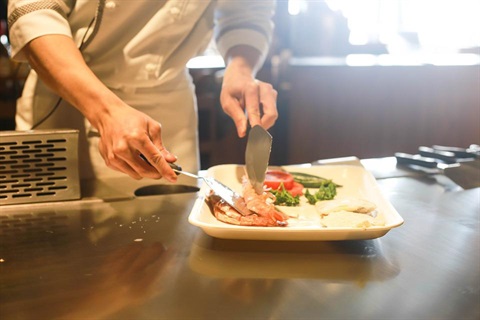Food Safety

If you are opening, purchasing or selling a food premises, or if you plan to serve food as part of your accommodation premises, there are a number of permits you may need to apply for before you can operate your business. Upon application and payment of an inspection fee, a pre-purchase inspection can be undertaken by an Environmental Health Officer to identify any issues regarding the food premises.
Please note that permits may also be required from Council’s Planning and Building Departments depending on the type of business and the changes you may be making. It is the applicant’s responsibility to ensure that all appropriate permits have been obtained.
Food Act New Registration or Renewal
Application form for food act new registration or renewal pdf form.
Design and fitout of your premises: Design and construction of food premises must be in accordance with Food Standard Australia New Zealand (FSANZ) Food Safety Standard 3.2.2 and 3.2.3 and suitable for the food activities conducted as part of the business. Copies of these standards are available on the www.foodstandards.gov.au. The Australian standard for design, construction and fit-out of food premises (AS 4674-2004) also provides valuable information for many proprietors in designing their premises.
*Please note: your new business (including home-based) may require the installation of a grease trap and/or a trade waste agreement. Please contact North East Water for further information and guidance.
Required Documents: There are no attachments if you have a template standard food safety program.
- Class 1 Premises - copy of the non-standard / independent food safety program Only (1) Copy
- Class 1 Premises - A current certificate from an approved food safety auditor indicating that the FSP is adequate only if applicable. Only (1) Copy
- Class 2 Premises - A current certificate from an approved food safety auditor stating that the FSP meets the requirements of the Act only if available. Only (1) Copy
- Class 2 Premises - if you have not attached the current certificate from an approved auditor - attach a copy of the non- standard / independent food safety program. (Do not attach QA Systems)
Collection Statement:
Your application and the personal information on this form is being collected by Moira Shire Council for the purposes of administrating your application for Registration of a Food Premises.
The information collected is required under the Food Act 1984 and will be used for the purpose it was collected and/or a directly related purpose. If you do not provide the information in your application it may result in the application not being accepted, lapsing or being refused. Information collected may be disclosed if required by legislation.
You must not submit any personal information or copyright material of third parties without their informed consent. By submitting the material, you agree that the use of the material as detailed above does not breach any third party’s right to privacy and copyright.
You can find out more about how we use and protect your information by viewing our Privacy Statement on our website www.moira.vic.gov.au. If you require access to the information you have provided, please contact Council.
Class 4 Food Premises
If you are planning to operate a temporary food premises (class 4) such as a community fundraiser, basic sausage sizzle or basic cake stall (no cream), you need to notify council of your activities. (It is an offence to fail to notify your council that you are operating such a food premises).
Mobile or Temporary Food Premises
Food Trader allows businesses and community groups that sell food from stalls and vans to make a registration application, lodge a notification or Statement of Trade and manage information. This can be done anytime day or night with no need to go to the Council office. Once your application has been accepted by Council you can trade anywhere in Victoria.
- Register your temporary and mobile food premises
- For further information email ehealth@moira.vic.gov.au or call 03 5871 9222.
Fees
Current registration fees can be provided upon application. This applies to
- Business selling high risk foods
- Business selling low risk foods
- Community groups
Transfer of registration fees are 50% of the annual registration fee.
Pre-purchase inspections are charged at 50% of the annual registration fee.
Additional information may be provided about food premises and food safety including
- Inspection of premises
- Complaints
- Food labelling matters
- Random sampling of products. This ensures compliance with the Food Act and Food Standards Code.
- Education seminars and advice to proprietors
- Any other general enquiries
The Environmental Health team at council can assist you with information regarding food premises within the municipality.
Further information can be found on the Department of Health website.